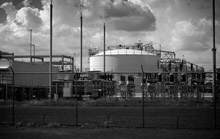
Typical street scene in Santa Ana, El Salvador. (Photo: iStock)
IMF Survey: Higher Oil Production, Better Security Improve Chad's Prospects
November 10, 2011
- Higher oil prices justify additional investment to boost crude extraction
- Authorities should find efficient, affordable way to shield poor from high fuel prices
- Response to 2009 famine threat contributed to record food crop in 2010
Helped by better security conditions, higher oil production and new industrial projects are set to boost Chad’s economic growth rate in 2012.

Oil installation in Chad: supply from new oil field means new oil refinery has potential to supply Chad’s current demand for petroleum products (photo: Newscom)
ECONOMIC HEALTH CHECK
The IMF’s regular assessment of the landlocked African nation’s economy expects GDP growth to spike above 7 percent in 2012 from around 3 percent this year, based on a slight increase in crude oil production and a full year of refinery operation, plus new electrical generation capacity and a new cement factory.
These infrastructure investments will also boost Chad’s GDP over the medium term, and could help to reduce the cost of key business inputs and alleviate electricity disruptions, a perennial constraint on the country’s business operations. Nevertheless, Chad needs to use the oil windfall to rebuild a savings buffer against the risk of an oil-price drop, and to ensure that new industrial plants can operate on a sound financial basis.
Recent years had witnessed a marked improvement in security conditions in Chad which, coupled with the oil boom, offered an unprecedented chance at development. However, conflict in neighboring Libya made itself felt as thousands of people fleeing the violence were repatriated to or via Chad, with the help of international agencies, and the government remains concerned about the security implications.
Strong recovery
With high oil export prices and record crops, Chad’s recent economic conditions have been good. Real GDP growth reached 13 percent in 2010, a strong recovery from the 2009 downturn. Oil production increased, as high oil prices justified additional investment to bolster extraction rates. With favorable rains, a bigger area under cultivation, and additional government-supplied farm inputs, agricultural production nearly doubled and food and consumer prices declined.
In June 2011, a new oil field began producing 20,000 barrels of crude oil per day to feed the new oil refinery, which has the potential to supply Chad’s current demand for petroleum products. With a more typical growing season this year, food prices recovered from their 2010 lows, pushing total consumer inflation back into positive territory.
This year, the IMF conducted its regular annual health check on Chad’s economy and, in cooperation with the World Bank, conducted an assessment of the country’s financial sector. At the IMF Executive Board meeting on September 7, Directors commended the Chadian authorities for their measures to support agriculture last year, but noted that oil-price volatility, and the expected trend decline in production, warranted building a savings buffer.
Oil price risk
Higher oil prices have boosted revenues, but Chad has struggled to control government spending and to make sure that the oil windfall is effectively spent on its stated poverty-reduction priorities. Furthermore, with current high oil prices, the health of both government finances and local banks is more than ever exposed to oil price risk.
Chad’s financial sector includes eight mostly foreign-owned commercial banks, whose assets amount to about 12 percent of GDP. The banks’ portfolios are highly concentrated on the government and its key suppliers, and therefore indirectly subject to the same oil price risk.
An oil price drop like that experienced in 2009 would cause a significant loss of revenue. Without a savings buffer, that would require the government to slow down its ambitious public investment program and make it tougher to pay suppliers in full and on time. In turn, suppliers would find it harder to service their debts and commercial banks’ nonperforming loans could rise.
Capital projects
The major capital projects that are close to completion are welcome, but, as the early days of the oil refinery showed, whether the new enterprises are operated on a sound financial basis will be key to their viability and their impact on growth.
In this regard, IMF Directors encouraged the authorities to find an efficient and affordable way to shield the poor from high fuel prices while allowing proper functioning of the refinery; to improve public financial management, especially investment spending; and to improve the business environment.
Protected from food crisis
Chad’s food security was a source of concern going into 2010. Poor rainfall in 2009 led to a one-third drop in agricultural production, putting about 2 million people (18 percent of the population) at risk of severe food shortage last year.
The government and international partners supplied emergency food, but the government also provided additional inputs to farmers and urged them to increase area under cultivation. These measures, plus favorable rains, led to a record harvest in 2010, nearly double that of 2009, and protected Chad from the international food price crisis.
In fact, food and consumer prices declined last year. With a more typical growing season this year, food prices rebounded from their 2010 lows, and consumer price inflation, although still low, has returned closer to its historic average.
Efforts to boost capacity
International agencies including the IMF, the World Bank, the African Development Bank, and United Nations Development Program; and donors including the EU and France, are devoting funding and expertise to bolstering Chad’s capacity to manage its public finances and to analyze and conduct economic policy. These partners are supporting efforts to improve public procurement, non-oil tax policy and collection, public expenditure effectiveness, banking supervision, and data collection and dissemination.
The IMF, alongside other international agencies and donors, continues to provide advice and technical assistance to bolster Chad’s capacity to conduct economic policy.


